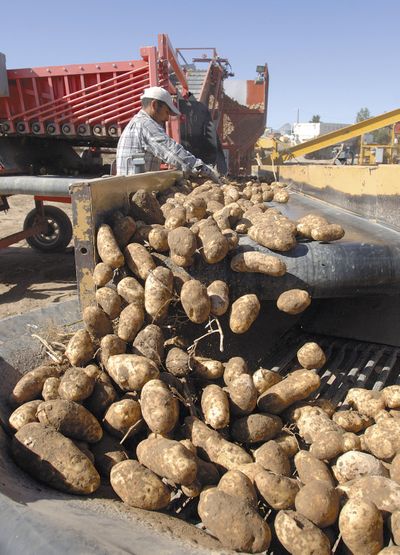Harvest time highlights Latinos’ role
Many upset by others’ bad behavior

IDAHO FALLS – Leonor Rodriguez has a message for Latinos in eastern Idaho whose bad behavior tends to put all Latino immigrants in a bad light: Go away.
Like most Latinos who immigrate to the United States, Rodriguez came here to provide for her family. Like many, she went to work in agriculture, spending four years working for Larsen Farms in Hamer.
Like most Latino immigrants, what she misses most about her home country of Mexico is her family.
“Sometimes family members die, and you can’t go” to Mexico to visit, Rodriguez said.
Rodriguez, who still lives in Hamer with her husband and four children, said she’s tired of all Mexicans being painted with the same brush every time a few Latinos – some of whom aren’t even from Mexico – commit a crime or otherwise stray from the straight and narrow.
“We came to work. We didn’t come to steal or to do things we shouldn’t do,” she said. “To those that come to do bad things, ‘Go away.’ ”
As harvest hits full swing in eastern Idaho, it’s a reminder of the role Latinos play in one of the state’s major industries. According to Idaho Department of Labor estimates, some 7,700 Latinos work in agriculture statewide. That’s about 8.2 percent of Idaho’s entire agricultural labor force.
“Clearly (Latinos) are significant,” Labor Department spokesman Bob Fick said. “You reduce any labor force by 8 percent, you’re going to put the arm on somebody. I mean, you’re going to cause problems.”
The uncomfortable truth is that many Latinos working in agriculture live in this country illegally – whether they entered illegally or overstayed their visas. An even more uncomfortable truth is that Idaho’s farms, economists and farmers say, need illegal immigrants to cultivate and harvest the fields.
Most uncomfortable of all is the fact that natural economic incentives make illegal immigrants more attractive workers. A worker with no rights is often willing to work hard and cheap and avoid trouble so as not to risk losing his or her job.
“The employers know that they can pay less and get the same service or even better service,” said Abelardo Rodriguez, an assistant professor of agricultural economics at the University of Idaho. “There are very few people who were born here in the United States that want to do those tasks.”
Even Tom Holm, who farms potatoes, wheat and alfalfa in eastern Idaho, and whose workers described him as a kind, fair boss who treats them well, acknowledged this perverse incentive. After an amnesty law passed in 1986, Holm said, Latino laborers were harder to find because the law opened the door for them to jobs in construction and other industries.
Some Latinos find it easier to simply avoid the United States’ expensive and labyrinthine immigration process. And so they live in fear of the day they’re discovered and sent packing.
“That’s also a psychological factor that sometimes depresses you,” said Augusto Gomez, a Peruvian native.
Gomez said all Latino immigrants “long for” the day they become citizens.
“It’s logical,” he said. “It’s the dream of all people, right?”